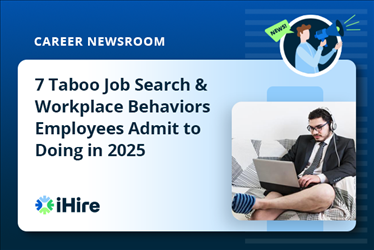- Job Seeker Resources
- |
- Last Updated: April 22, 2025

Leaving a Government Job for the Private Sector: Public vs. Private Sector Jobs, Resumes & More
Recent federal layoffs have left many government employees reevaluating their career paths. This year, the Department of Government Efficiency’s (DOGE) Workforce Optimization Initiative has sparked discussions about workforce transitions. This initiative is driving many to consider switching from public- to private-sector roles.
But transitioning from a government job to the private sector isn’t just about updating your LinkedIn profile. It’s about strategy.
The gap between public and private work cultures can feel immense. Government roles often involve slower, more bureaucratic processes. In contrast, private-sector jobs tend to be fast-paced and profit-driven. However, your government experience offers transferable skills, such as regulatory expertise, and private employers value these skills.
The key? Learn how to move from public- to private-sector roles by repackaging your resume and acing job interviews.
Whether you’re leaving a government job for the private sector by choice or necessity, this guide breaks down the steps to make your move a success.
Understanding the Public Sector vs. Private Sector Divide
The decision to leave government service often stems from a desire for change. Federal layoffs or goals such as higher pay or career advancement drive this transition.
Ask yourself why you’re making the switch. Do you want a faster-paced environment or more independence? Clear goals steer your efforts toward industries and roles that align with your values and vision. This makes the transition to corporate roles more intentional.
Recognize External Factors Driving Change
Layoffs by the federal government and DOGE’s policy changes are forcing many to question their career security. These shifts expose how unstable some government jobs can be. At the same time, they make private-sector roles more appealing.
Understanding these dynamics can help you frame your departure as a proactive move. Remember, it’s not just about leaving. It’s about stepping toward something better. This enables you to tap into the growing demand for your skills in the private sector.
Comparing Government vs. Private Sector Jobs
Federal roles develop transferable skills, such as project management and regulatory expertise. Leaving a government job for the private sector requires skillfully reframing your experiences. Managed a public program? That’s client service experience in the corporate world.
The government and private sector use different terms to convey similar ideas. In the public sector, “revenue” might mean tax collection. In the private sector, it refers to profit.
Adjusting your vocabulary and mindset to reflect a business-oriented focus is necessary. Moreover, the private sector values agility. It prioritizes results over procedures. This requires a cultural shift that you must prepare for as you transition.
Building a Strategic Job Search Plan
Knowing how to move from public- to private-sector employment starts with having a plan.
Apply With an Achievement-Focused Resume
A federal resume is often lengthy and detailed. It contrasts sharply with the concise, achievement-focused private-sector resume that’s typically no longer than two pages and includes these core sections:
- Title
- Summary
- Key skills
- Experience and achievements
- Education and training
- Certifications and professional credentials
To succeed in moving from public to private-sector roles, revise your resume to highlight measurable outcomes. Highlight results, such as “cut costs by 20%.” Use tools such as iHire’s free resume builder to quickly and easily create a polished document that appeals to corporate recruiters.
Target Industries and Roles That Value Government Experience
Certain private-sector fields, such as defense contracting and compliance, particularly value the expertise federal workers bring. Research relevant industries to speed up your transition. This structured approach, with the help of a 2025 job search planner/checklist, keeps you organized and proactive.

Networking and Professional Development
Networking is important for private-sector success. Start with existing contacts and reach out to colleagues and industry peers. Then, expand your reach through professional platforms and events.
Engaging in discussions about your career change can uncover hidden opportunities. This will help you understand corporate expectations. It can also smooth your shift from public-sector to private-sector employment.
Your government experience gives you a solid base. However, private-sector roles may demand additional skills or knowledge of specific software or tools. Pursue targeted training or certifications to bridge these gaps. Attending a career clarity webinar can also help you refine your identity.
Preparing for Interviews and Cultural Shifts
Private-sector interviews differ from federal ones. They often focus more on behavioral questions, such as “Tell me about a time you solved a problem under pressure.”
Learn how to answer job interview questions with the STAR method (situation, task, action, and result) and refine your responses. This can help you convey your value to your next employer. Additionally, expect a workplace that may feel more fast-moving than you’re used to.
Leaving a government job for private-sector employment also involves practical considerations. Assess how to handle federal benefits such as the Thrift Savings Plan or maintain security clearances if relevant to your new role. Time your exit carefully to avoid disruptions.
Everything You Need for a Successful Job Search in One Place
Create your free account today to get started!

Job Seeker Sign In
We Value Your Privacy
Overcoming the Challenges Involved in Moving to the Private Sector
Departing from a stable federal career can bring about uncertainty and loss of identity, particularly amid federal layoffs. Acknowledge these feelings and seek support, whether through mentors or professional counseling, to maintain your well-being. Try to see this change as a chance to grow.
One important but often overlooked challenge is salary negotiation in the private sector. The federal government applies fixed pay scales. The private sector offers pay flexibility, which may include bonuses and equity. Research industry standards and state your worth.
The private sector’s hiring process may involve multiple rounds and rejections, testing your resolve. Persistence is important. Each attempt builds your understanding of corporate expectations. Treat setbacks as chances to refine your approach. This gives you an upper hand when moving from a public to a private-sector role.
Making Your Transition With the Right Resources and Tools
Transitioning from the public to the private sector isn’t just about a new job. It’s also a mindset shift, particularly in the wake of federal layoffs and initiatives such as those by DOGE. But with the right prep, your government experience may become your greatest asset.
For additional guidance, check out these related iHire resources to help you move from the public to the private sector:
Making a Career Change
Career Clarity: The Secret to Finding Your Passion [On-Demand Webinar]
How to Identify Transferable Skills for a Career Change
5 iHire Features to Help You With Your Career Change
iHire Masterclass: Overcoming Ageism [Online Course]
Searching for the Right Job
Curated and Verified Jobs on iHireHR
iHire’s 2025 Job Search Planner & Checklist
Communicating Effectively in Your Job Search: 18 Email Templates [eBook]
Ultimate Guide to Job References
Browse Hiring Companies [Directory]
Writing a Private Sector Resume
Achievements: Keys to a Kickass Resume [On-Demand Webinar]
Create a Job-Winning Resume With iHire’s Resume Builder
Work With a Professional Resume Writer
Creating a Cover Letter
Cover Letters Decoded [On-Demand Webinar]
How to Write a Cover Letter After a Gap in Employment
A Cover Letter That Works [Template]
Acing Your Interview
9 Secrets to Selling Yourself in an Interview [On-Demand Webinar]
Interview IQ: How to Handle Tough Questions Like a Pro [On-Demand Webinar]
How to Answer Job Interview Questions With the STAR Method [Worksheet]
iHire Masterclass: Interviewing [Online Course]
Preparing for a Job Interview: Research Checklist & Worksheet
Negotiating the Salary You Deserve
7 Salary Negotiation Mistakes to Avoid at All Costs [On-Demand Webinar]
Sample Emails for Salary Negotiation [Templates]
iHire Masterclass: Salary Negotiation [Online Course]
Networking
Ask a Career Advisor: How Do I Build My Professional Network From Scratch?
Reconnect With Old Colleagues Without Being Awkward [Templates]
Sign In or Register to access all articles and insider tips for help in your job search.
Search for Human Resources Jobs
RELATED JOBS
HR Specialist Visible local non-profit organization is seeking support of a HR Specialist to...
Recruiting CoordinatorOur client, a leading financial services firm, is seeking a detail-oriented and proactive...
Director, Human ResourcesAbout FlightSafety International FlightSafety International is the world's premier professional...
HR Business Partner, TechnologyCULTIVATE A BETTER WORLD Food served fast does not have to be a typical fast-food experience....
HR CoordinatorHR Coordinator A Great Opportunity / Full Time / $19.00 per hour Through a wide range of...
RELATED RESOURCES
Find the Right Job Faster
- Get personalized job matches sent to your inbox every day
- Connect directly with employers before your competition
- Advance your career with expert advice on interviewing, salary negotiation, and more
We value your privacy




